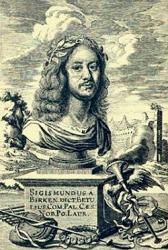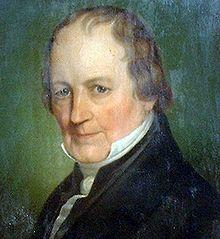1802 - 1884 Hymnal Number: 204 Author of "Herr! weihe diese Schule hier" in Evangelisches Gesangbuch Lange, Johann Peter, D.D., son of Peter Lang or Lange, farmer and carrier on the estate of Bies, near Sonnborn, Elberfeld, was born at the Bies, April 10, 1802. In 1822 he entered the University of Bonn as a student of theology; and in the beginning of 1826 he became assistant to Pastor Emil Krummacher of Langenberg. In June 1826 he was appointed second pastor at Wald near Solingen; in 1828 second pastor of the Reformed church at Langenberg, and in 1832 second pastor at Duisburg. He was then appointed professor of Church History and Dogmatics at Zurich, as successor to D. F. Strauss, and entered on his duties at Easter, 1841; receiving shortly thereafter D.D. from Bonn. After Easter, 1854, he was professor of Systematic Theology at Bonn (also Consistorialrath after 1860), and continued to lecture up to five days before his death. He died at Bonn, July 8, 1884 (Koch, vii. 361; 0. Kraus, 1879, p. 324, &c).
Lange is best known as a theologian, and by such works as his Life of Christ, 1844; his Bibel-Werk, 1857, ff., a commentary on the whole Bible which he edited in conjunction with various German scholars (English edition by Dr. P. Schaff and others), &c. During his tenure of office at Zurich, he began the fashion of giving University lectures on hymnology (1842), and published a large hymn-book (Deutsches Kirchenliederbuch, Zürich, 1843) with an elaborate introduction and a considerable body of notes. He is the most important modern hymn-writer of the German Reformed Church. He was, however, a thinker rather than a poet. His productions are primarily thoughtful, picturesque, imaginative, and deeply spiritual poems for private reading; and have little of the popular tone and style fitted for use in the services of the church. They appeared mostly in his (1) Biblische Dichtungen, vol. i., Elberfeld, 1832; vol. ii. Elberfeld, 1834; (2) Gedichte, Essen, 1843; (3) Vom Oelberge, Frankfurt-am-Main, 1852; 2nd edition 1858.
Comparatively few of Lange's hymns are in German common use. Those which have passed into English are:—
i. Hymns in English common use:--
i. Der Herr ist auferstanden. Easter. In his Biblische Dichtungen, vol. i., 1832, p. 155, in 17 stanzas of 7 lines. In his Vom Oelberge, 1852, p. 28, only st. i., vii., xiv.-xvii., were retained, and this form is No. 517 in Dr. Schaff’s Deutsches Gesang-Buch 1874. Translated as:—
The Lord of Life is risen. A good translation of the 1852 text, by Dr. H. Harbaugh, in the German Reformed Guardian, April 1860, p. 106, repeated in Hymns for the [German] Reformed Church in the United States, Philad., 1874; also in Schaff’s Christ in Song, 1869 and 1870.
ii. Unsre Lieben sind geschieden. For Mourners. In his Biblische Dichtungen, vol. ii., 1834, p. 172, in 10 stanzas of 6 lines, entitled ,”The Home Going." In F. Seinecke's Evang. Liedersegen, 1862, No. 412. Translated as:—
Our beloved have departed. By Mrs. Findlater, omitting stanzas v., vii., ix., in Hymns from the Land of Luther, 2nd Ser., 1855, p. 28 (1884, p. 93). Repeated, in full, in Holy Song, 1869. The translations of stanzas i., ii., viii., x., altered, and beginning, "Do we mourn for friends departed," are in J. A. Johnston's English Hymnal, 1856; and the same cento, varied, and beginning, "Weep we sore for friends departed," is in Kennedy, 1863.
iii. Was kein Auge hat gesehen. Eternal Life. A fine hymn, founded on 1 Cor. ii. 9. In his Biblische Dichtunge, vol. ii., 1834, p. 92, in 13 stanzas of 6 lines. A form, in 7 stanzas, is included in Dr. Schaff’s Deutsches Gesang-Buch, 1874. Translated as:—
What no human eye hath seen. A good translation, by Miss Borthwick, omitting stanzas ii., viii., xi., xiii., in Hymns from the Land of Luther, 2nd Ser., 1855, p. 73 (1884, p. 130). Repeated, in full, in Holy Song, 1869, and Kennedy, 1863; and abridged in the Methodist New Congregational Hymn Book, 1863, and Flett's Collection, Paisley, 1871.
ii. Hymns not in English common use:--
iv. Auf den dunklen Bergen. Passiontide. 1832, p. 145, in 12 stanzas. Translated as: "Upon the mountain dark and drear," by Dr. R. Maguire, 1883, p. 68.
v. Es ist noch nichts verbrochen. Encouragement, 1834, p. 103, in 8 stanzas. Translated as: “Sure the Lord thy God hath spoken," by Dr. R. Maguire, 1883, p. 121.
vi. Gott mit uns! mit uns auf Erden, Christmas. A fine hymn, written in 1830 on "Immanuel—God with us." 1832, p. 71, in 6 stanzas. Translated as: "God with us! In flesh combining," by C. T. Astley, 1860, p. 27.
vii. Hier und dort im wilden Meere. Christ at Bethany. 1832, p. 138, in 9 stanzas. Translated as: "Mid the ocean deep and wide," by Dr. R. Maguire, 1883, p. 52.
viii. Ich weiss ein stilles, liebes Land. The Churchyard. 1834, p. 167, in 12 stanzas. Translated as: I know a sweet and silent spot," by Mrs. Findlater, in Hymns from the Land of Luther, 1858, p. 54 (1884, p. 174).
ix. Lass mich diese Welt verstehen. Cross and Consolation. Gedichte, 1843, p. 61, in 5 stanzas. Translated as: "In the light, Lord, of Thy cross," by J. Kelly, 1885.
x. Mein Vater ist der grosse Herr der Welt. Privileges of Christians. Founded on 1 Cor. iii. 21. 1834, p. 106, in 8 stanzas. Translated as:—"My Father is the mighty Lord, Whose arm," by Mrs. Findlater, in Hymns from the Land of Luther. 1854, p. 54(1884, p. 55).
xi. Schöne Sonne, kommst du endlich wieder. Trust in God, 1834, p. 90, in 10 st. Translation as: "Sun of comfort, art thou fled forever," by Miss Borthwick, in Hymns from the Land of Luther, 1855, p. 10 (1884, p. 77).
xii. Sey du mein Freund, und schau in meine Brust. Supplication. Suggested by 1 John ii. I. 1834, p. 88, in 7 stanzas. Translated as: “Be Thou my Friend, and look upon my heart," by Mrs. Findlater, in Hymns from the Land of Luther, 1858, p. 41.
xiii. So gross ist Gottes Welt. Wonders of Day and Night. Vom Oelberge, 1852, p. 121, in 9 stanzas entitled "Two Worlds." Translated as: "So wide, so richly stored," by Miss Borthwick, in the Family Treasury, 1867.
xiv. Wo Lämmer schlafen, wacht die Hirtentreue. Christmas. 1834, p. 23, in 2 stanzas of 4 lines, and 2 of 3 lines. Translated as: "Where the lambs sleep, there shepherds watch around," by Mrs. Findlater, in Hymns from the Land of Luther, 1862, p. 17. [Rev. James Mearns, M.A.]
--John Julian, Dictionary of Hymnology (1907)
Johann Peter Lange


 My Starred Hymns
My Starred Hymns




